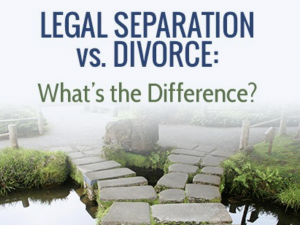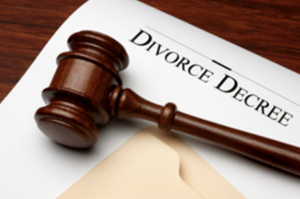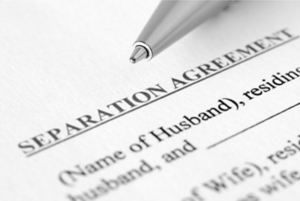Did you know, you can be legally separated, but not divorced? Divorce and legal separation fall under the same statute, and as a result, they have a lot of similarities but there are some distinct differences that separate the two.

In both situations, courts can divide assets and debts, determine child custody, and award child and spousal support using the same criteria. Both legal separation and divorce may also involve name changes and protective orders.

In either of these situations, spouses are still allowed to put together their own settlement agreement, and if they are unable to agree on one, they may have to take their cases to court and have issues decided by a judge or commissioner depending on the stage of your case.

Despite these strong similarities, however, they are not the same in their outcome. A divorce legally terminates a marriage, while in a legal separation, the couple remains married.

Divorce
Washington is a no-fault state, meaning that there is no legal requirement to assign blame or accuse one party of wrongdoing in order to file for divorce. All it takes is for one spouse to declare that the marriage is “irretrievably broken” and at least one spouse to live in Washington.
When a couple divorces, it takes at least 90 days from the date the case begins to the finalization of the divorce decree, provided the parties are in agreement. The actual length of time it takes to finalize a case will depend on a number of factors such as:
- Whether or not the parties are amicable
- Whether or not the couple can agree on key matters such as the parenting plan schedule and spousal support, requiring these issues to be further negotiated either through mediation or litigation.

Legal Separation
There are many reasons why a couple might choose the latter route:
- They want to take an extended ‘break’ to determine whether or not divorce is the best solution to their marital difficulties.
- One spouse wants to remain on the other’s medical insurance because they do not have coverage of their own.
- One or both spouses might have religious reservations about divorce.
If the couple chooses to finalize their legal separation they must wait six months to convert the separation to a divorce. Either party may file the motion to convert and since the substantive issues, such as child custody, support, and the division of marital assets and liabilities, were already addressed and resolved in the legal separation process, the transition to divorce is a comparatively straightforward process. There is no associated filing fee to convert the Decree of Legal Separation to a Decree of Dissolution. In the end, a simple order is issued indicating that the Decree of Legal Separation has been converted to a Decree of Dissolution of Marriage.
However, a legal separation can also be undone if both spouses choose to do so. If the legal separation case is still pending with the court, the parties can request that the case be dismissed by filing a Notice of Reconciliation which will stop the action from proceeding any further; however, if it was finalized into a final Decree of Legal Separation then a Motion to Vacate the Decree of Legal Separation would need to be filed and once completed it is as if the legal separation never happened.

At Bliss Law Group, we can provide caring and experienced advice during your divorce or legal separation. We will also ensure that your rights are protected from beginning to end. For more information, please visit us online at www.blisslawgroup.com or call (253) 844-4412 to be connected with one of our exceptional attorneys.

